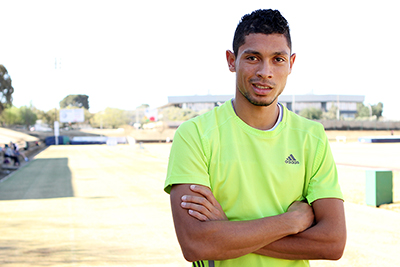
Wayde van Niekerk
Photo: Anja Aucamp |
On Saturday 13 June 2015, Wayde van Niekerk clocked 44.24 seconds at the 400m finish line of the Diamond League meeting in New York. Van Niekerk’s gold-medal performance improved on his previous South African record of 44.38.
The Kovsies champion sprinter now occupies third position in the world 400m rankings after beating former 400m record holder, Christopher Brown of the Bahamas, whose 44.74 dash earned silver, and United States’ Tony McQuay’s 45.26 won him bronze.
Van Niekerk experienced it as “a good race and a good confidence booster” in light of his forthcoming Diamond League meetings on 4 July in Paris (400m) and 14 July in Lucerne (200m).
The university was made proud recently when Van Niekerk broke the 1986 African record on Sunday 7 June 2015 at the Diamond League meeting in Birmingham. He made his mark with a time of 31.63 seconds, thus smashing Ivorian Gabriel Tiacoh’s 31.74.
In a single week, Wayde van Niekerk sets new African record, which placed him in 10th place on the world list in the 300m, and improves on a national record set by South African sprinter, Morné Nagel in 2006.